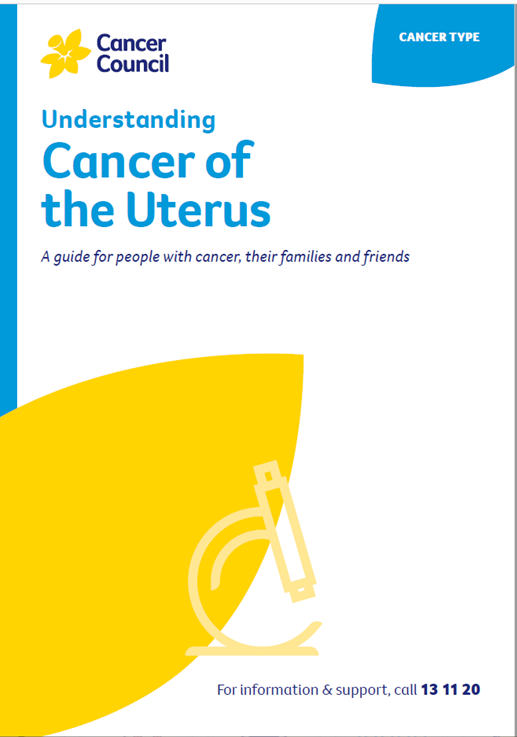- Home
- Cancer of the uterus
- Diagnosing cancer of the uterus
- Your health care team
Your health care team
If you have symptoms that might be caused by cancer of the uterus (endometrial cancer), your general practitioner (GP) will arrange the first tests. If these tests do not rule out cancer, you will be referred to a gynaecological oncologist or gynaecologist for more tests.
If cancer of the uterus is diagnosed, the specialist will consider treatment options. To ensure the best outcome, it is recommended that you are treated by a specialist gynaecological cancer team.
Treatment options will often be discussed with other health professionals at what is known as a multidisciplinary team (MDT) meeting. During and after treatment, you’ll see a range of health professionals for various aspects of your care.
To find cancer specialists, multidisciplinary teams and hospitals in NSW or ACT, you can visit the NSW Government website CanRefer.
Health professionals you may see
| gynaecological oncologist | diagnoses and performs surgery for cancers of the female reproductive system, (e.g. cancer of the uterus, or cervical, ovarian, vulvar and vaginal cancers) |
| gynaecologist | specialises in diseases of the female reproductive system; may diagnose cancer of the uterus and then refer you to a gynaecological oncologist |
| radiation oncologist | treats cancer by prescribing and overseeing a course of radiation therapy |
| medical oncologist | treats cancer with drug therapies such as chemotherapy, hormone therapy, targeted therapy and immunotherapy (systemic treatment) |
| cancer genetics specialist | specialises in understanding cancers that have occurred as a result of inherited risk |
| cancer care coordinator | coordinates your care, liaises with other members of the MDT and supports you and your family throughout treatment; care may also be coordinated by a clinical nurse consultant (CNC) or clinical nurse specialist (CNS) |
| nurse | administers drugs and provides care, information and support throughout treatment |
| fertility specialist | diagnoses, treats and manages infertility; may be an obstetrician, gynaecologist or reproductive endocrinologist |
| women’s health physiotherapist | assists with physical problems associated with gynaecological cancers, such as bladder and bowel issues, sexual issues and pelvic pain |
| lymphoedema practitioner | educates people about lymphoedema prevention and management, and provides treatment if lymphoedema occurs; often a physiotherapist or occupational therapist |
| psychologist, counsellor | help you manage your emotional response to diagnosis and treatment |
→ READ MORE: Cancer of the uterus treatment
More resources
A/Prof Orla McNally, Consultant Gynaecological Oncologist, Director Oncology/Dysplasia, Royal Women’s Hospital, Honorary Clinical Associate Professor, University of Melbourne, and Director of Gynaecology Tumour Stream, Victorian Comprehensive Cancer Centre, VIC; A/Prof Yoland Antill, Medical Oncologist, Peninsula Health, Parkville Familial Cancer Centre, Cabrini Health and Monash University, VIC; Grace Guerzoni, Consumer; Zeina Hayes, 13 11 20 Consultant, Cancer Council Victoria; Bronwyn Jennings, Gynaecology Oncology Clinical Nurse Consultant, Mater Hospital Brisbane, QLD; A/Prof Christopher Milross, Director of Mission and Radiation Oncologist, Chris O’Brien Lifehouse, NSW; Mariad O’Gorman, Clinical Psychologist, Liverpool Cancer Therapy Centre and Bankstown Cancer Centre, NSW.
View the Cancer Council NSW editorial policy.
View all publications or call 13 11 20 for free printed copies.
Need to talk?
Support services
Coping with cancer?
Speak to a health professional or someone who has been there, or find a support group or forum
Need legal and financial assistance?
Practical advice and support during and after treatment
Cancer information
Patient rights and responsibilities
What you can reasonably expect from your health care providers
Resource hub
Guides, fact sheets, videos, podcasts and more for people with cancer, their families and friends

